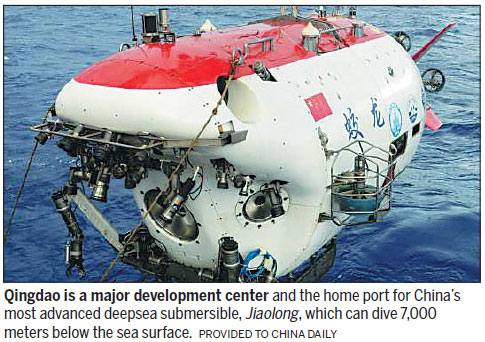Maritime industry rides waves of modernization
By Zhang Dandan| (China Daily)| Updated : 2018-06-09
Print PrintShandong has vowed to establish world-class seaports, perfect its modern maritime industry and enhance its sustainable maritime environment - to forge core competitiveness and global influence.
Shandong Peninsula has a coastal area of 159,000 square kilometers and a coastline of 3,345 kilometers, which accounts for one-sixth of the whole coastline of the country.
It is home to the Port of Qingdao, Yantai Port and Rizhao Port, each with an annual handling capacity of more than 400 million metric tons.

Liu Jiayi, Party chief of Shandong, said that the province has to leverage its own geographical advantage on the oceans to forge an all-round openness and upgraded business environment.
The Port of Qingdao, China's second largest port for foreign trade, has an annual handling capacity of 500 million tons and can berth the world's largest bulk freighters.
An automatic container handling terminal developed by the Port of Qingdao was put into use on May 11. The port claims the proprietary intellectual property rights for the terminal, which can handle 42.9 containers per hour - a world record.
Yantai Port, which has been operating since 1861, has transported goods to more than 100 ports in over 70 countries and regions, and imports the most bauxite, used in the production of aluminum, in China.
The port has established a terminal in Guinea as well as opened its own shipping line, which allows the direct shipment of bauxite from the West Africa country to Yantai. It imports 30 million tons of bauxite from Guinea annually.
Shandong also has five other ports, namely Rizhao Port, Weihai Port, Dongying Port, Weifang Port and China Binzhou Port.
In May, Shandong integrated China Binzhou Port, Dongying Port and Weifang Port, so that they could develop faster and cooperate with one another.
"This is just the first step for Shandong to restructure and upgrade its ports, which shows the province is about to forge itself into a strong hub for the maritime economy," said Wang Zhongwu, professor at Shandong University.
Shandong's efforts in developing a modern maritime industrial chain have generated positive results. Strong foundations have been built in maritime ecology, high-end equipment, seawater desalination and green maritime chemicals engineering.
Thanks to the development, a batch of renowned enterprises, such as China International Maritime Containers Raffles, or CIMC Raffles, and Shandong Oriental Ocean Group Co, has sprung up.
CIMC Raffles, a maritime engineering equipment supplier, is a leader in Shandong's high-end maritime manufacturing industry.
The company has constructed one of the largest maritime drilling platforms in the world, which has a height of nearly 37 floors. It can operate in waters as deep as 3,000 meters and can drill as deep as 15,200 meters.
CIMC Raffles' drilling platforms are used across the world's main oil production regions, including the North Sea off the coast of Norway.
The traditional maritime industry of Shandong is also showing signs of development potential.
Shandong Xingfa Fishery, an aquatic products company, processes and cans tuna from the Indian Ocean and exports it to Europe, America, Japan and South Korea.
"In the past, we could only process and export raw materials for primary production, the prices of which were quite low. But after updating our technology, we are now capable of producing products with extremely high-added value," said Gao Feiyue, manager of Shandong Xingfa Fishery.
Shandong is in the process of establishing a maritime economy reform and development zone, aimed at consolidating competitive maritime industries, accelerating high-tech maritime industries and enhancing maritime services, according to the local government.
In accordance with a government plan, the added value of Shandong's modern maritime industry is expected to hit 2.3 trillion yuan ($362.37 billion) by 2022.
zhangdandan@chinadaily.com.cn
(China Daily 06/09/2018 page6)

 2024 Shandong Rural Cultural and Tourism Festival
2024 Shandong Rural Cultural and Tourism Festival  Celebrate Spring Festival in Zibo
Celebrate Spring Festival in Zibo  Share your views on 2024 China's govt work report
Share your views on 2024 China's govt work report